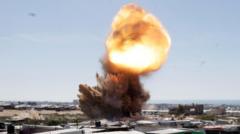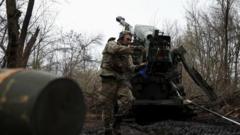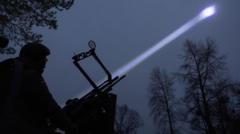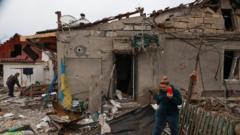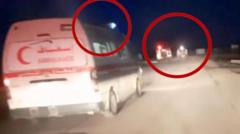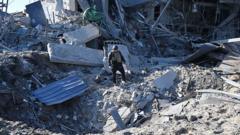Recent reports from Gaza reveal a tragic increase in infant mortality attributed to frigid temperatures and inadequate living conditions. As medical professionals highlight the dire situation, tensions concerning aid and humanitarian support between Hamas and Israel intensify.
Tragedy Strikes Gaza: Rising Baby Deaths Due to Cold Weather
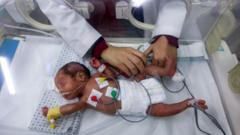
Tragedy Strikes Gaza: Rising Baby Deaths Due to Cold Weather
Six infants have died in Gaza in the last two weeks, with the region's harsh winter exacerbating the humanitarian crisis, medics reported.
Gaza's healthcare professionals are grappling with a devastating reality as six babies have died due to the excruciating cold within the past fortnight. Medics at the Patient's Friends Benevolent Society (PFBS) hospital in Gaza City report that nine newborns suffering from cold-related injuries were admitted recent weeks, resulting in the deaths of five infants, while another remains in critical condition. The hospitalization of a two-month-old girl, who succumbed to the cold near Khan Younis, further accentuates the dire circumstances faced by families in the region.
Urgent calls have been made by the PFBS hospital for immediate assistance in providing caravans and fuel to enhance living conditions for an estimated 945,000 displaced individuals who are residing in tents and makeshift structures. The embattled Palestinian organization Hamas has publicly accused Israel of not complying with agreements regarding the supply of necessary shelter materials during an ongoing ceasefire that commenced five weeks ago, which Israel firmly denies.
The humanitarian plight is exacerbated as approximately 70% of the buildings in Gaza have been severely damaged or destroyed during the protracted conflict, and the healthcare system has suffered a significant collapse. Currently, only 18 of the 35 hospitals remain partially operational, contending with shortages of critical medical equipment and resources.
Meteorological data indicates that nighttime temperatures in Gaza have frequently dipped below 10 degrees Celsius (50°F), with readings as low as 3 degrees Celsius (37°F) reported on recent nights. Doctors at PFBS have voiced significant concerns regarding vulnerable newborns severely affected by hypothermia and cold injuries, attributing the tragic outcomes to inadequate shelter and resources.
Attempts to address the urgent needs of affected families are further complicated by ongoing negotiations related to humanitarian protocols between Hamas and Israel, including calls for the entry of medical supplies and shelter provisions. Meanwhile, graveside reports of the deceased infants, such as the two-month-old Sham Yousef al-Shambari, reveal tragic accounts of parents who have lost children due to cold exposure, raising alarms among health officials.
Ultimately, the head of the Hamas-led health ministry in Gaza claims that a total of 15 children have perished from the cold since the onset of winter, alleging non-compliance from Israel regarding humanitarian measures. In an increasingly frantic environment, the stubborn realities of aid access, shelter, and rising mortality rates among the youngest in Gaza's population draw attention to the urgent need for comprehensive humanitarian intervention.
As the ceasefire negotiations waver, uncertainties loom over the future of the ongoing truce, with the humanitarian crisis facing the region reaching critical levels.



